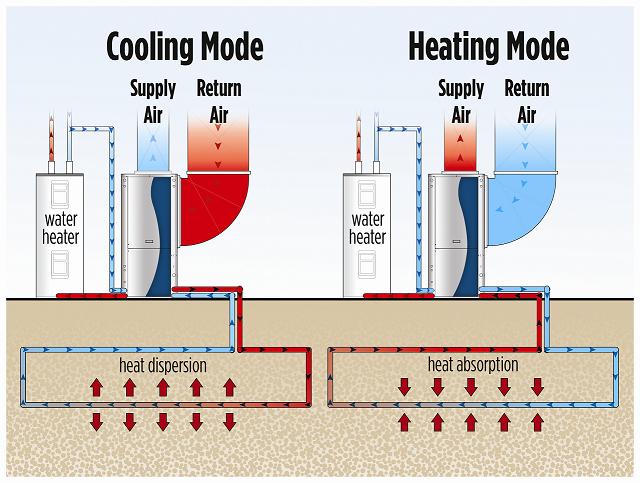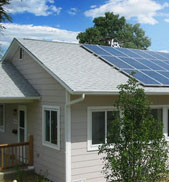What is a Geothermal Heat Pump?
A geothermal heat pump, also known as geoexchange, is gaining popularity as a clean and efficient renewable energy technology used to heat and cool a home. A geothermal heat pump is an electrically powered refrigeration unit which transfers energy to and from the earth. You already have a heat pump in your home—your refrigerator. If you put your hand behind it, you’ll feel the heat that has been pumped from the fridge’s inside. How does it work? Beneath the earth’s surface, the temperature is a constant 50 to 60 F, a natural and everlasting source of heat. The geothermal heat pump takes advantage of this constant heat source by transferring and concentrating the heat to provide:
- A source of heat energy for space heating
- A heat sink for space cooling
- A source of heat for domestic hot water
How It Works
A typical system consists of a ground loop system filled with a water solution, a heat exchanger, and ductwork into the building. During the winter, heat from the ground is absorbed by the water solution as it circulates through pipes in the ground. The warmed water is carried into the home where a water-to-air heat pump concentrates the thermal energy and transfers it to air in a conventional ductwork system, which is circulated to heat the home. In the summertime, this process is reversed and excess heat is pumped from the home either into the ground or redirected to heat domestic hot water in order to cool the home.

Alternatively, a water-to-water heat pump concentrates the thermal energy to be used in a hydronic radiant floor heating system. The process is reversed during the summer, and heat from the house is transferred through the heat pump into the water solution in the ground pipes, which then carry excess heat into the ground.
In addition to space heating, geothermal exchange systems can be equipped with a device called a desuperheater, which recycles the waste heat from the heat pumps compressor and uses it to heat water. These devices can provide domestic hot water in addition to supplementing a solar thermal water heater or conventional water heating system. This is especially efficient in the summer cooling months because the excess heat being removed from the house is redirected into the hot water tank instead of back into the ground, resulting in free hot water. During the winter, the heat from the ground can be used to heat water as well as the home, sometimes reducing winter water heating by 50%.
Types of Ground Loops
Benefits and Efficiency of Geothermal Heat Pumps
Installation and Cost










